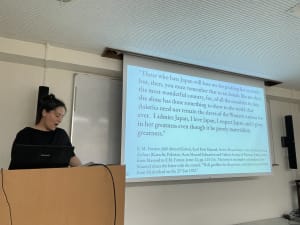Report
On September 19, 2025, the Tobunken Seminar hosted Dr. Mimi Hanaoka (University of Richmond) for a lecture titled “Negotiating Asian Modernity: Educational Reform, Hyderabad, and Japan, 1868–1926.” Dr. Hanaoka is currently preparing a monograph on Syed Ross Masood's interwar visit to Japan—undertaken in his capacity as an official responsible for educational reform in the princely state of Hyderabad—and on the report he produced. The lecture provided an overview of this research, highlighting its theoretical contributions to the field of Inter-Asian Studies. Approximately fifteen participants attended, both in person and online, and the presentation was followed by a lively discussion engaging both factual and theoretical issues.
Event Details
Lecture Title:
Negotiating Asian Modernity: Educational Reform, Hyderabad, and Japan, 1868-1926
Speaker:
Professor Mimi Hanaoka (Associate Professor of Religious Studies and Special Assistant to the Provost at the University of Richmond)
Chair:
Professor Kazuo Morimoto (Professor in Islamic and Iranian History, Institute for Advanced Studies on Asia, University of Tokyo)
Date and Time:
19 September (Fri) 2025, at 18:00-19:30 (JST)
Venue:
Room 303, Institute for Advanced Studies on Asia, Hongo Campus, University of Tokyo (東京大学東洋文化研究所3階、大会議室303), and online via Zoom
Abstract:
This project explores two sites geographically located on the peripheries of European empires and revolving like an increasingly tighter double-helix around them: the Muslim-ruled princely state of Hyderabad in British colonial India and early modern Japan during the years 1868-1926. As the global world order transitioned from an era of empire to nation over the 19th century, whether and how a nation might be modern without being western became a vexed question. I argue that Masood envisioned a particular type of Muslim imperial nationalism and Muslim modernism that was possible during the politically liminal period in India during the 1920s and 1930s but which became incompatible with political and social realities after Partition in 1947.
Anchoring the narrative in the biography and peregrinations of Syed Ross Masood and his official report on Japan’s educational system, Negotiating Asian Modernity explores how the Indian Muslim educator Syed Ross Masood looked to Japan as a model of imperial Asian modernity. Masood served as a bureaucrat for the Muslim ruler of the Indian princely state of Hyderabad for whom he wrote a report, titled Japan and its Educational System (1923), about Japan’s educational system and how and why it should serve as a model for Hyderabad’s educational system.
Speaker's Bio:
Mimi Hanaoka is the author of Authority and Identity in Medieval Islamic Historiography: Persian Histories from the Peripheries (Cambridge University Press, 2016), which explains themes and literary strategies that “centered” texts from “peripheral” regions in medieval Persia. She has published numerous articles on Islam, identity, and trans-regional linkages, and her work has appeared in such journals as History of Education Quarterly, Mizan, Journal of Persianate Studies, and Iranian Studies. Outside of the academy, her work has been published in various outlets with mass reach and appeal, including Grantland, Guernica, Los Angeles Times, GlobalPost, and National Geographic’s Glimpse. For more information, visit https://religiousstudies.richmond.edu/faculty/mhanaoka/ .
Contact Person: Kazuo Morimoto (morikazu@ioc.u-tokyo.ac.jp)
This event is co-organized by the Institute for Advanced Studies on Asia, University of Tokyo (organized by the Regular Research Project W-1: Approaches to the “Persianate World” as a Tobunken Seminar) and the Japan Regional Office of the Association for the Study of Persianate Societies (as a Gilas Lecture).

